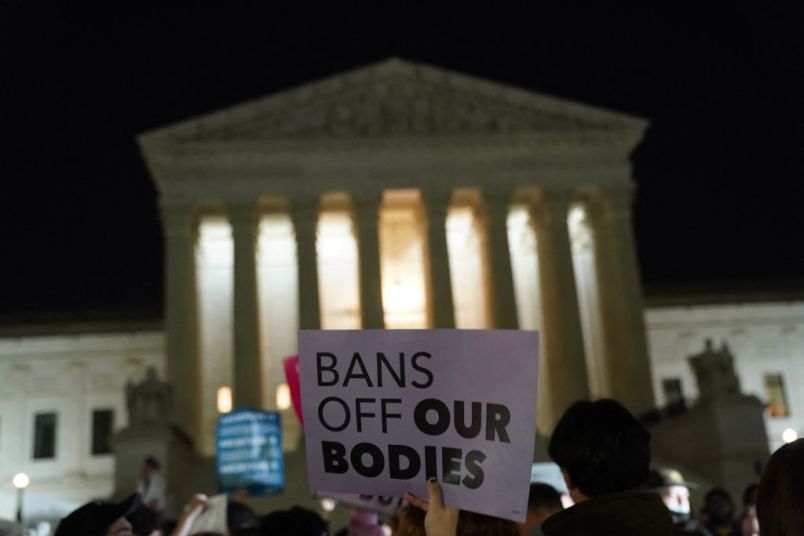Speculation has abounded over who may have leaked Justice Samuel Alito’s draft opinion overturning Roe v. Wade.
But there’s a question key to understanding the range of possible answers: who in the Supreme Court has access to draft opinions? What processes does the Court maintain to circulate these closely held documents?
TPM spoke with several former Supreme Court clerks, including four who held the job during Chief Justice John Roberts’ tenure, to better understand who has access to draft opinions, and how the Court’s internal processes work. (TPM did not speak to any clerk who had worked at the Court since the COVID-19 pandemic, which may have further altered some processes.)
Crucial to understanding who would have had access to this opinion, these clerks said, is the fact that Politico appears to have obtained and published a copy of the document that was at one time printed out. That suggested that it was “a physical copy,” not just an electronic one, according to Travis Crum, a Washington University in St. Louis law professor who clerked for Justices Kennedy and Stevens in 2014 and 2015.
Also important, some of the former clerks noted, was that the draft opinion included a stamp in the upper right hand corner. The stamp is added “when you have a draft to circulate — they print it out, and then stamp it,” another former law clerk told TPM.
From that point, former clerks said, there are four categories of Supreme Court staff that would have access to a physical copy of a draft opinion of the kind obtained by Politico. For each, leaking an opinion would be a huge risk without parallel in recent history. It remains unclear whether the person who did so was from one of these four groups of Court workers, or are someone else entirely.
“The four most obvious categories of who would have legally had access to that document would be the justices, of course, their clerks, their assistants,” and aides that carry the physical copies between the chambers, Jamal Greene, a Columbia Law professor who clerked for Justice Stevens, told TPM.
Each category has different duties when it comes to circulating a draft opinion.
Justices
Justices, of course, have access to draft opinions.
They draft them and, crucially, simultaneously receive hard copies of opinions from other justices who have completed their drafts. Leaking one to the press would be a stunning breach — though, with lifetime appointments, it’s not clear what the consequences would be beyond broken trust within the Court.
Law Clerks
Each associate justice has four law clerks, while the chief justice has five. They help draft the opinions themselves, including by conducting legal research.
Among those who have access to draft opinions, clerks are the most heavily engaged in the creation of the opinion and in their analysis upon receipt. “The majority opinion would get circulated to all of the other chambers when it was drafted, because that’s how, for instance, if you were planning to write a dissent, that’s how you would know what you were disagreeing with,” said Paul Schiff Berman, a George Washington University Law professor who clerked for Justice Ruth Bader Ginsburg from 1997 to 1998.
Several former clerks recalled working on two sets of computers in the Supreme Court: one connected to the internet, and another airgapped, operating only internally.
“When I was there, you had two terminals in front of you as a clerk — one connected to the internet, one not,” David Pozen, a Columbia Law Professor who clerked for Justice Stevens in 2009 and 2010, recalled. “You were only supposed to draft opinions on the not-internet-connected ones so it couldn’t be hacked.”
It’s one of the most prestigious jobs available for recent law school graduates. Leaking a draft opinion would threaten the person’s legal career, potentially their bar status, and place all the work that it took to get to the position as a Supreme Court clerk in jeopardy.
Secretaries
Each justice has two secretaries working in their chambers, sometimes called judicial assistants, the clerks said.
Though their exact responsibilities are up to each justice, their functions tend to be split: one essentially works as an executive assistant, handling scheduling and phone calls. The other tends to oversee legal business and paper flow.
When a draft opinion is completed and ready for circulation, secretaries stamp it, checking a box for the office that will receive it.
The former clerks argued to TPM that secretaries tend not to have time to review draft opinions in depth, and pointed out that they are typically loyal to their justice — in this case as well, it’s difficult to imagine them leaking the document.
Aides
The final category of person who would have access to draft opinions is chambers’ aides: typically long-time employees of the Court who are frequently called on to physically transport documents between chambers.
Pozen described the aides as tending to be “apolitical civil servants” who usually have long careers at the Court — different from clerks, who cycle through after a year. An aide leaking it would also be unprecedented.
“They’re delivering cert petitions, hard copies of documents, that would have been among their main tasks,” Greene said.







Then there is category 1b. Wives of Supreme Court Justices. Lookin’ at you, Ginni.
So, the most likely leaker would be a courageous clerk. Bless them whoever they are.
If a physical copy was leaked they won’t find who did it. Politico isn’t going to out their source and the leaker won’t out himself/herself.
“Wait 'til Ginni sees this,” said Clarence as he stood at the copy machine.
Courageous or incredibly stupid? If a clerk ever did such a thing their career would be over. I’m going with Ginni, she has the patent on stupid.